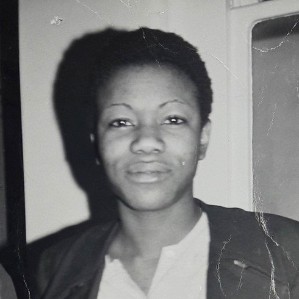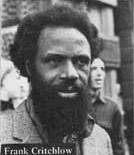
The 1981 Brixton riot, or Brixton uprising, was a series of clashes between mainly black youths and the Metropolitan Police in Brixton, London, between 10 and 12 April 1981. It resulted from racist discrimination against the black community by the mainly white police, especially the police's increased use of stop-and-search in the area, and ongoing tensions resulting from the deaths of 13 black teenagers and young adults in the suspicious New Cross house fire that January. The main riot on 11 April, dubbed "Bloody Saturday" by Time magazine, resulted in 279 injuries to police and 45 injuries to members of the public; over a hundred vehicles were burned, including 56 police vehicles; almost 150 buildings were damaged, thirty of which were burnt out, and many shops were looted. There were 82 arrests. Reports suggested that up to 5,000 people were involved. The Brixton riot was followed by similar riots in July in many other English cities and towns. The Thatcher government commissioned an inquiry, which resulted in the Scarman Report.

Leighton Rhett Radford "Darcus" Howe was a British broadcaster, writer and racial justice campaigner. Originally from Trinidad, Howe arrived in England as a teenager in 1961, intending to study law and settling in London. There he joined the British Black Panthers, a group named in sympathy with the US Black Panther Party.

Farrukh Dhondy is an Indian-born British Parsi writer, playwright, screenwriter and left-wing activist who resides in the United Kingdom.

Railton Road runs between Brixton and Herne Hill in the London Borough of Lambeth. The road is designated the B223. At the northern end of Railton Road it becomes Atlantic Road, linking to Brixton Road at a junction where the Brixton tube station is located. At the southern end is Herne Hill railway station.

Olive Elaine Morris was a Jamaican-born British-based community leader and activist in the feminist, black nationalist, and squatters' rights campaigns of the 1970s. At the age of 17, she claimed she was assaulted by Metropolitan Police officers following an incident involving a Nigerian diplomat in Brixton, South London. She joined the British Black Panthers, becoming a Marxist–Leninist communist and a radical feminist. She squatted buildings on Railton Road in Brixton; one hosted Sabarr Books and later became the 121 Centre, another was used as offices by the Race Today collective. Morris became a key organiser in the Black Women's Movement in the United Kingdom, co-founding the Brixton Black Women's Group and the Organisation of Women of African and Asian Descent in London.

Obi Benue Egbuna was a Nigerian-born novelist, playwright and political activist known for leading the Universal Coloured People's Association (UCPA) and being a member of the British Black Panther Movement (1968–72) during the years when he lived in England, between 1961 and 1973. Egbuna published several texts on Marxist–Black Power, including Destroy This Temple: The Voice of Black Power in Britain (1971) and The ABC of Black Power Thought (1973).
The Mangrove was a Caribbean restaurant in Notting Hill, London, England. It was founded in 1968 and run by civil rights activist Frank Crichlow, eventually closing in 1992. It is known for the trial of a group of British black activists dubbed "the Mangrove Nine", who were tried for inciting a riot at a 1970 protest against the police targeting the restaurant.

Frank Gilbert Crichlow was a British community activist and civil rights campaigner, who became known in 1960s London as a godfather of black power activism. He was a central figure in the Notting Hill Carnival. His restaurant, The Mangrove in All Saints Road, served for many years as the base from which activists, musicians, and artists organised the event.
Race Today was a monthly British political magazine. Launched in 1969 by the Institute of Race Relations, it was from 1973 published by the Race Today Collective, which included figures such as Darcus Howe, Farrukh Dhondy, Linton Kwesi Johnson, Leila Hassan and Jean Ambrose. The magazine was a leading organ of Black politics in 1970s Britain; publication ended in 1988.

The Mangrove Nine were a group of British Black activists tried for inciting a riot at a 1970 protest against the police targeting of The Mangrove, a Caribbean restaurant in Notting Hill, West London. Their trial lasted 55 days and involved various challenges by the Nine to the legitimacy of the British judicial process. They were all acquitted of the most serious charges and the trial became the first judicial acknowledgement of behaviour motivated by racial hatred within the Metropolitan Police.
The International Book Fair of Radical Black and Third World Books, often referred to as The Black Book Fair, was inaugurated in London, England, in April 1982 and continued until 1995, bringing together a number of Black publishers, intellectuals and educationalists. It was held on 12 occasions: annually from 1982 to 1991, and then biennially, in 1993 and 1995. The first three Book Fairs took place in different areas of London — Islington, Lambeth and Acton — representing the respective bases of the three founding organisers: New Beacon Books, Race Today Publications and Bogle-L'Ouverture Publications. Additionally, from 1985, there were associated book fairs held elsewhere in England, in Manchester and Bradford (1985–93), Leeds, and in 1993 and 1995 in Glasgow, Scotland. In 1987 and 1988, a sister event — the Caribbean Peoples International Bookfair and Bookfair Festival — took place in Trinidad, organised by the Oilfields Workers' Trade Union there.

Mala Sen was a Bengali-Indian-British writer and human rights activist. As an activist, she was known for her civil rights activism and race relations work in London during the 1960s and 1970s, as part of the British Asian and British Black Panthers movements, and later her women's rights activism in India. As a writer, she was known for her book India's Bandit Queen: The True Story of Phoolan Devi, which led to the acclaimed 1994 film Bandit Queen. After researching the oppression of women in rural India, she also published Death by Fire in 2001.

Guerrilla is a British drama television series set in early 1970s London, against the backdrop of the Immigration Act 1971 and British black power movements such as the British Black Panthers and Race Today Collective. It was written and directed by John Ridley and stars Idris Elba, Freida Pinto and Babou Ceesay in leading roles. Guerrilla debuted on Sky Atlantic on 13 April 2017 and on Showtime on 16 April 2017.
Neil Emile Elias Kenlock is a Jamaican-born photographer and media professional who has lived in London since the 1960s. During the 1960s and 1970s, Kenlock was the official photographer of the British Black Panthers, and he has been described as being "at the forefront of documenting the black experience in the UK". Kenlock was the co-founder of Choice FM, the first successful radio station granted a licence to cater for the black community in Britain.

Altheia Jones-LeCointe is a Trinidadian physician and research scientist also known for her role as a leader of the British Black Panther Movement of the 1960s and 1970s. Jones-LeCointe came to public attention in 1970 as one of the nine protestors, known as the Mangrove Nine, arrested and tried on charges that included conspiracy to incite a riot, following a protest against repeated police raids of The Mangrove restaurant in Notting Hill, London. They were all acquitted of the most serious charges and the trial became the first judicial acknowledgement of behaviour motivated by racial hatred, rather than legitimate crime control, within the Metropolitan Police.

Barbara Beese is a British activist, writer, and former member of the British Black Panthers. She is most notable as one of the Black activists known as the Mangrove Nine, charged in 1970 with inciting a riot, following a protest against repeated police raids of The Mangrove, a Caribbean restaurant in Notting Hill, west London. They were all acquitted of the most serious charges and the trial became the first judicial acknowledgement of behaviour motivated by racial hatred, rather than legitimate crime control, within the Metropolitan Police.

Mangrove is a 2020 historical drama film directed by British director Steve McQueen and co-written by McQueen and Alastair Siddons, about the Mangrove restaurant in west London and the 1971 trial of the Mangrove Nine. It stars Letitia Wright, Shaun Parkes, Malachi Kirby, Rochenda Sandall, Alex Jennings and Jack Lowden.
Leila Hassan Howe is a British editor and activist, who was a founding member of the Race Today Collective in 1973, having previously worked for the Institute of Race Relations. She became editor of the Race Today journal in 1986. Hassan was also a member of the Black Unity and Freedom Party. She is co-editor of a collection of writings from Race Today published in 2019.
Ian Alexander Macdonald QC was a Scottish barrister who was "a pioneer of committed anti-racist legal practice" in the UK. During the 1970s he appeared in many notable political and human rights cases, including those involving the Mangrove Nine, the Angry Brigade, and the Balcombe Street siege. He took silk in 1988 and was leader of the British bar in immigration law for five decades until his death at the age of 80.
The Universal Coloured People's Association (UCPA) was a black power organisation in the United Kingdom from June 1967 to July 1970.













